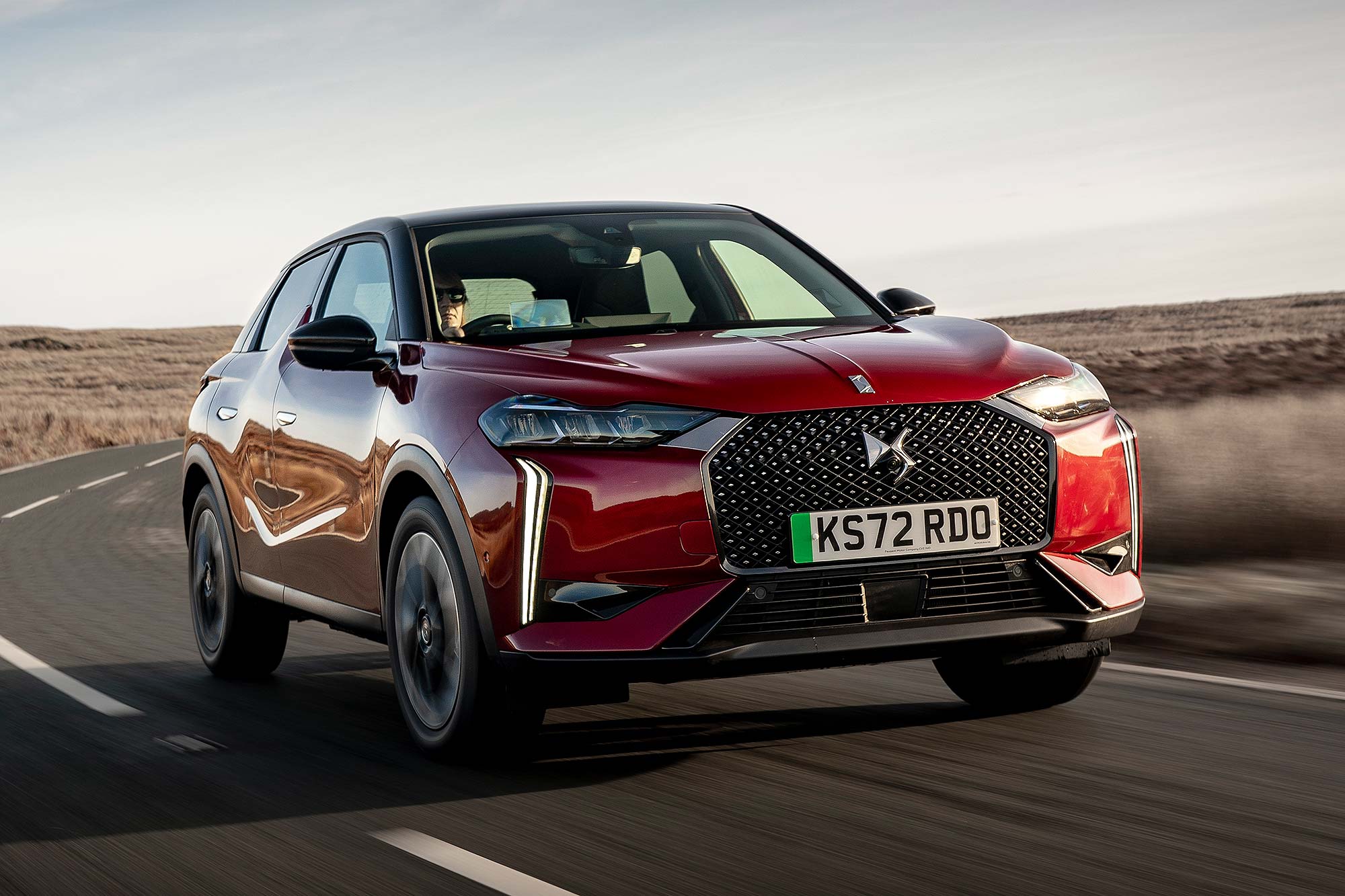DS 3 Review 2025: Price, specs & boot space
Written by Richard Aucock
Quick overview
Pros
- Upmarket interior design
- Eye-catching styling
- Generous level of equipment
Cons
- Limited rear-seat space
- Small boot capacity
- Not very enjoyable to drive
Overall verdict on the DS 3
“The DS 3 is a defiantly leftfield take on the crossover SUV, with a focus on style and luxury. Aesthetics are put above practicality and the driving experience, though.”
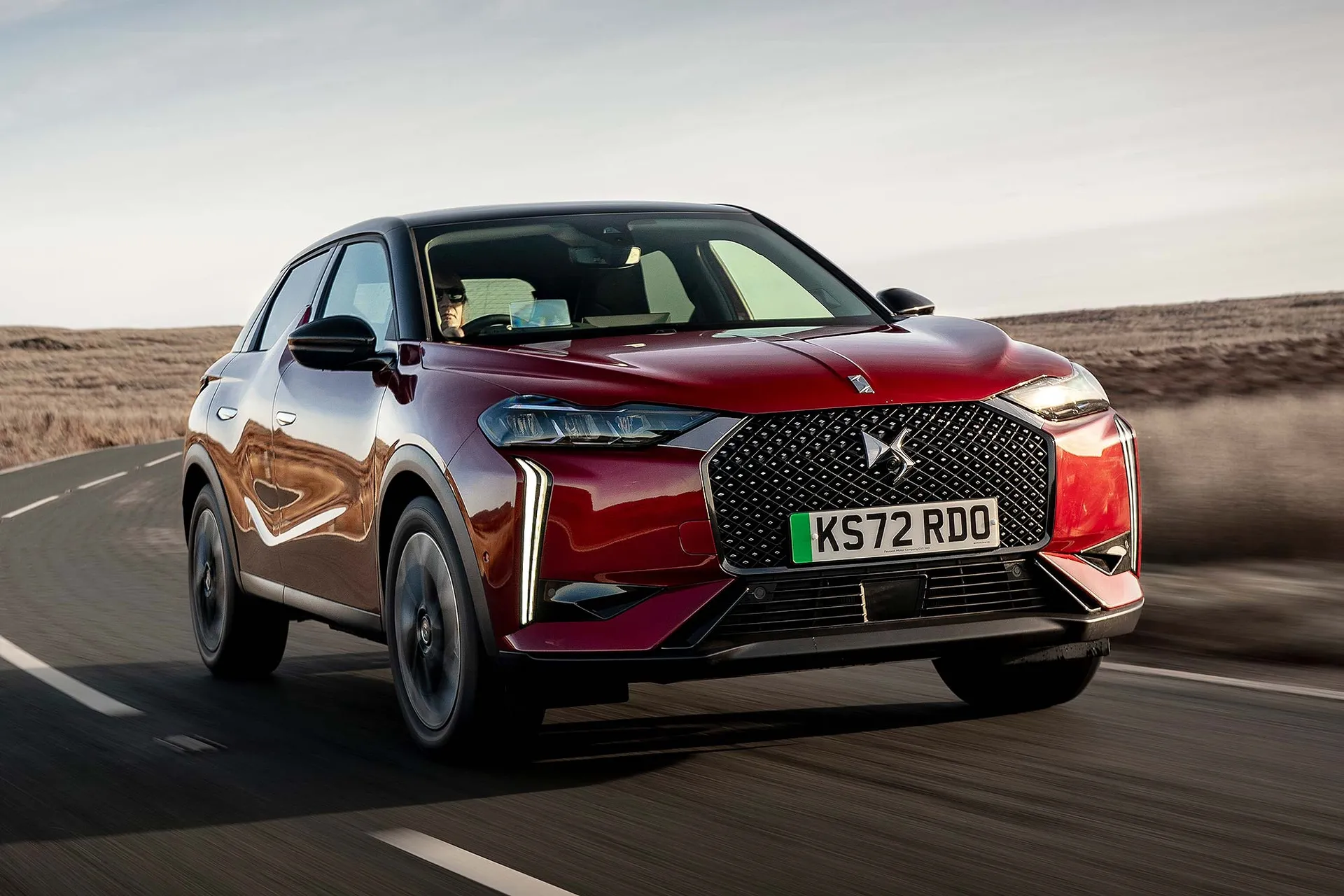
The small SUV market continues to grow, with a huge amount of vehicles available. There is now an SUV to suit every taste and budget, with the DS 3 proving that even French eccentricity can be catered for.
Forget any comparisons with the old Citroen DS 3 hatchback, first introduced in 2010. Instead, this is a model from the standalone DS Automobiles luxury brand – and was first introduced in 2018 as the DS 3 Crossback. A later rebrand saw the Crossback name dropped, leaving the DS 3 compact SUV we know today.
Positioning the DS 3 as a luxury crossover means it is pitched against rivals like the Audi Q2, Volkswagen T-Cross, and MINI Countryman. Whether the DS 3 can match them on outright quality is questionable, but it certainly makes a pitch for being the most extravagant SUV.
There is a choice of two petrol engines for the DS 3, both of which are versions of a turbocharged three-cylinder unit. An electric version, badged DS 3 E-Tense, is best treated as an entirely separate model.
Ride quality is on the firm side, and the DS 3 is not particularly engaging to drive, with a surprising amount of body-roll when cornering. It means this SUV is best driven steadily and smoothly, enjoying the plush interior found inside all versions.
The standard specification for the DS 3 is also generous, but the range-topping Opera model is the genuine standout model. With Nappa leather trim, it helps justify the premium price tag attached.
The DS 3 is not going to be the compact crossover for everyone, thanks to its divisive styling and limited practicality. Being rather expensive will certainly curtail the number of buyers it appeals to as well.
However, if you want an SUV that will stand out in the car park, the DS 3 is certainly one way to make an impression. heycar has 1000s of used cars for sale, including a wide range of DS 3s for sale.
Is the DS 3 right for you?
The DS 3 is likely to be a relatively niche proposition in the crossover family SUV market. This is due to its limited practicality, relatively expensive pricing, plus the fact it offers a driving experience that is not particularly inspiring.
Nonetheless, should you want a compact SUV that looks different to the rest, and do not have to worry about space inside, the DS 3 could appeal. The interior finish on the fanciest Opera models is particularly impressive, with plenty of luxurious Nappa leather.
What's the best DS 3 model/engine to choose?
All of the trim levels across the DS 3 range are notably plush, and all feature a generous level of standard equipment.
The entry-level Puretech 100 petrol engine, with a manual gearbox, is solely offered for the Performance Line version of the DS 3.
To truly engage with the DS 3’s luxury lifestyle image, a more powerful Puretech 130 engine is combined with an automatic eight-speed transmission. Not only does this bring more power, making the DS 3 easier to drive, the automatic gearbox naturally adds to the premium experience.
When it comes to trim levels, the range-topping Opera version is the most impressive. With its Nappa leather upholstery, extra equipment and styling enhancements, it offers the best DS 3 experience. It is not cheap, however, but going all-in makes sense if this is the compact crossover for you.
What other cars are similar to the DS 3?
The world is not short of compact crossover SUVs, and the DS 3 is another addition to a very long list. Key competitors include the Ford Puma, Vauxhall Mokka, Peugeot 2008 and Skoda Kamiq.
More premium alternatives exist in the form of the Volkswagen T-Cross, MINI Countryman and Audi Q2. However, the DS 3 certainly stands out from these vehicles, given its emphasis on dramatic styling.
For those who like the DS 3, but prefer the idea of electric power, there is also the DS 3 E-Tense, which we’ll review separately.
Comfort and design: DS 3 interior
“If you have ever wondered what it might be like to drive a designer handbag, the DS 3 will provide you with the answer.”

Diamonds need to be your best friend should you be interested in a DS 3, with the motif used extensively throughout the cabin. Everything from the air vents to the switchgear – and even the instrument panel – uses the same diamond-shaped design.
‘Avant garde’ is perhaps the best way to describe the layout of the DS 3’s interior, although it is not the most user-friendly design. Remembering what each touch-sensitive button does can be a challenge, and having an infotainment display angled slightly away from the driver in right-hand-drive models does not help.
The front seats are undeniably comfortable, regardless of the trim level chosen, but there is little in the way of side support. Combined with the DS 3’s tendency for body-roll, this will certainly limit your enthusiasm for corners.
Quality and finish
Thankfully, the interior quality of the DS 3 matches its price tag and premium image that it comes with.
Even the most basic version of the DS 3 has seats and a dashboard that are trimmed in Alcantara, while the fanciest Opera model is upholstered in opulent Nappa leather.
This certainly helps lift the DS 3 above its siblings in the Stellantis automotive group, with some of the detailing being particularly impressive. However, looking more closely will still unearth some less-than-premium switchgear, shared with regular Peugeot and Citroen models.
DS has used the diamond theme consistently throughout the cabin, applying this to a host of touch-sensitive buttons. These may look neat, but the reality is that traditional switches would function far better. Sometimes the old ways just work.
Infotainment: Touchscreen, USB, sat nav and stereo in the DS 3
All DS 3 models come with a centrally mounted 10.3 multimedia touchscreen. This features a DAB radio, plus the ability to wirelessly mirror Apple CarPlay and Android Auto smartphone apps. Built-in satellite navigation is included on Esprit de Voyage and Opera models, along with voice recognition and over-the-air updates.
The DS 3’s touchscreen does work well, responding relatively quickly to inputs and moving smoothly between menus. However, the touchscreen has to be used to change some of the climate control settings, which is a lesson in complication and frustration.
A digital instrument panel is also included as standard across the DS 3 range. This is a relatively small 7.0-inch display, and only has limited customisation options compared to the offerings from rival manufacturers. Although it shows the important information clearly enough, finding other data feels like hard work.
All models come with a single USB-C connection in the front, while Esprit de Voyage and Opera models also gain a USB-A port in the rear. A head-up display is included on the range-topping Opera version, too.
Space and practicality: DS 3 boot space
By crossover SUV standards the DS 3 is relatively compact. It measures 4118mm in length and is 1802mm wide. Combine these dimensions with the DS 3’s dramatic styling and the result is an SUV that is not particularly spacious, and can feel claustrophobic inside.
For those in the front, a shallow windscreen and high seating position emphasise the limited space. There is still a respectable amount of headroom and legroom, but storage space is limited to a small glovebox and tiny door pockets.
Rear-seat space is noticeably limited. The unusual design of the B-pillar makes the windows quite small, which could make children feel claustrophobic. Adults will struggle with legroom, while headroom is in short supply due to the curving roofline.
Compared to other compact SUVs, the DS 3 also has a small boot capacity. With the rear seats in place, it can hold 350 litres of luggage. For comparison, a Ford Puma will take 456 litres and the Skoda Kamiq holds 400 litres. A high loading lip makes boot access in the DS 3 a little awkward, too.
The result is a crossover SUV that really prioritises style over practicality.
Handling and ride quality: What is the DS 3 like to drive?
“The DS 3 has clearly been designed with comfort in mind, but the ride quality falls short of luxury expectations.”
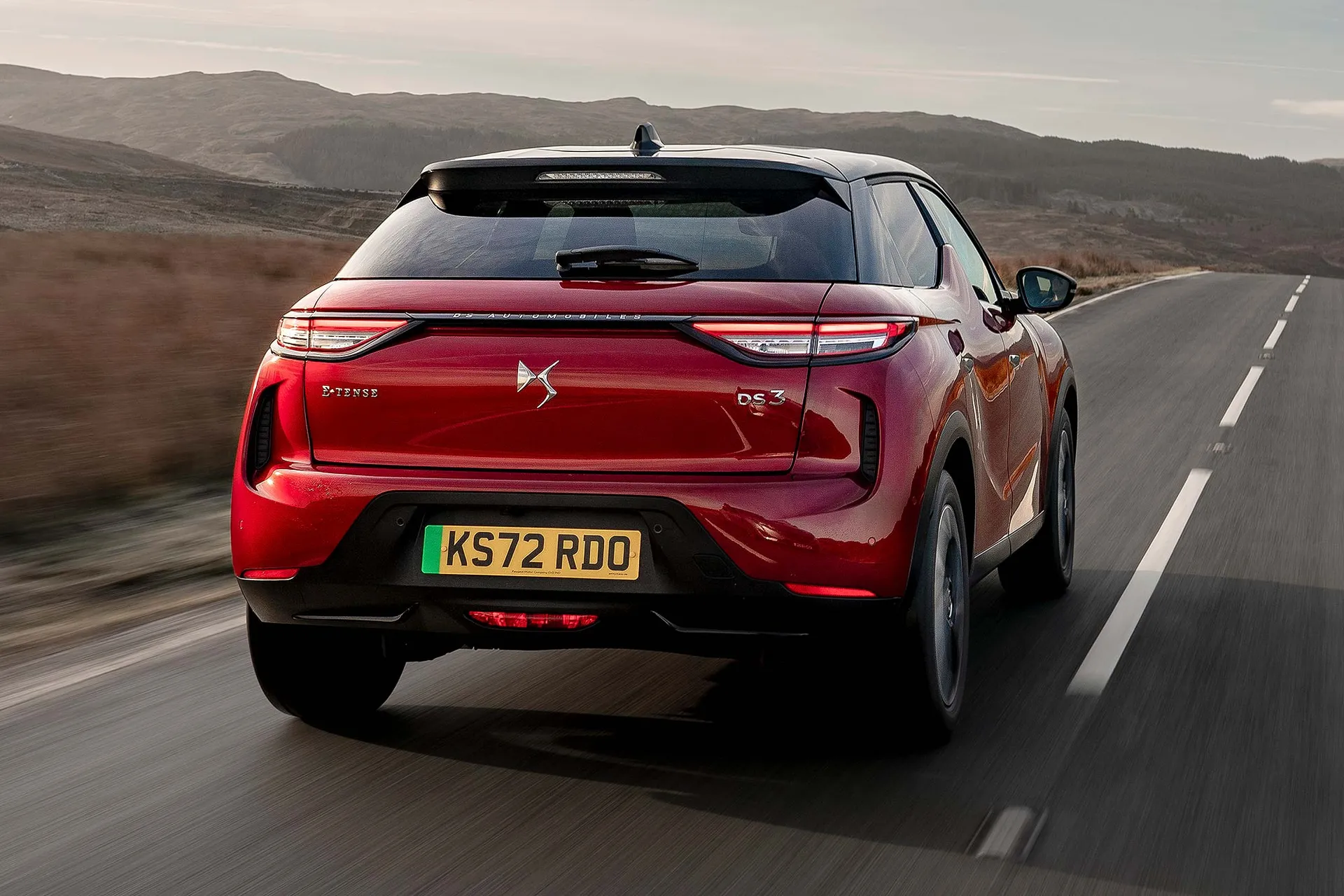
It is important to remember that, unlike many other manufacturers, DS Automobiles does not pitch the DS 3 as being a sporty SUV to drive. Instead, the DS 3 is intended to be a comfortable car first, putting aside ideas of carving through corners for fun.
As a result, the DS 3 is not the most agile of compact crossovers. There is a noticeable degree of body-roll, something that wouldn’t be present in a Ford Puma, yet there is still plenty of grip on offer. The steering is light but precise, allowing the car to be threaded along country roads without much effort.
Where the DS 3 struggles is with ride quality. At motorway speeds it is acceptable, but around town the suspension struggles to deal with potholes and other bumps in the road. The result is a lot of jolts and shudders being transmitted back to the cabin.
This is amplified by Esprit de Voyage and Opera models, with their larger 18-inch alloy wheels and low-profile tyres. Rivals such as the Audi Q2 and Ford Puma deliver a sportier driving experience, but also with a more balanced and refined ride quality.
What engines and gearboxes are available in the DS 3?
DS Automobiles has condensed the petrol options for the DS 3 down to just two choices, both of which are variations on a 1.2-litre turbocharged three-cylinder engine.
The starting point in the range is now the Puretech 100, offered solely for the entry-level Premium Line model. This is also the only DS 3 to come with a six-speed manual gearbox.
Producing 100PS and 205Nm of torque, the Puretech 100 manages not to feel overwhelmed by the weight of the DS 3. It reaches 62mph in 10.9 seconds and can push on to a top speed of 118mph. For those doing urban trips it will be fine, but motorway runs will require more effort.
The DS 3 Esprit de Voyage and Opera models come with a more powerful Puretech 130 engine, combined with an eight-speed automatic transmission. With an increased output of 130PS and 230Nm of torque, the 0-62mph time is reduced to 9.2 seconds.
While the eight-speed automatic gearbox copes well with higher-speed journeys, it can become flustered when pulling out of junctions around town. Engaging Sport mode increases the shift speed quite dramatically.
Refinement and noise levels
Although the DS 3 has been created with luxury in mind, the peppy three-cylinder petrol engines are not the last word in refinement. These engines also see service in other Stellantis products, such as the Vauxhall Corsa, and emit a familiar offbeat growl.
The engine noise is not unpleasant, but perhaps more noticeable than those buying a premium-brand model might expect. Naturally, the separate electric DS 3 E-Tense would be much quieter.
Thrummy petrol engines aside, the DS 3 does a good job of shielding those inside from external wind and road noise.
Safety equipment: How safe is the DS 3?
The latest DS 3 has not been tested by the Euro NCAP safety organisation since being rebranded in 2022. However, the pre-facelift DS 3 Crossback was evaluated back in 2019.
The standard model was awarded a four-star rating, but gained the maximum five stars when assessed with the Safety Pack, which added active safety braking.
As part of the changes to the DS 3 range, an impressive level of standard safety equipment is now standard across the range. All models come with active braking, lane keeping assist, lane departure warning and intelligent speed adaptation.
Opera models come with blind-spot monitoring, although this can be added to other trim levels as part of an option pack.
MPG and fuel costs: What does a DS 3 cost to run?
“With a pair of small petrol engines, the DS 3 offers the benefit of respectable fuel economy figures.”
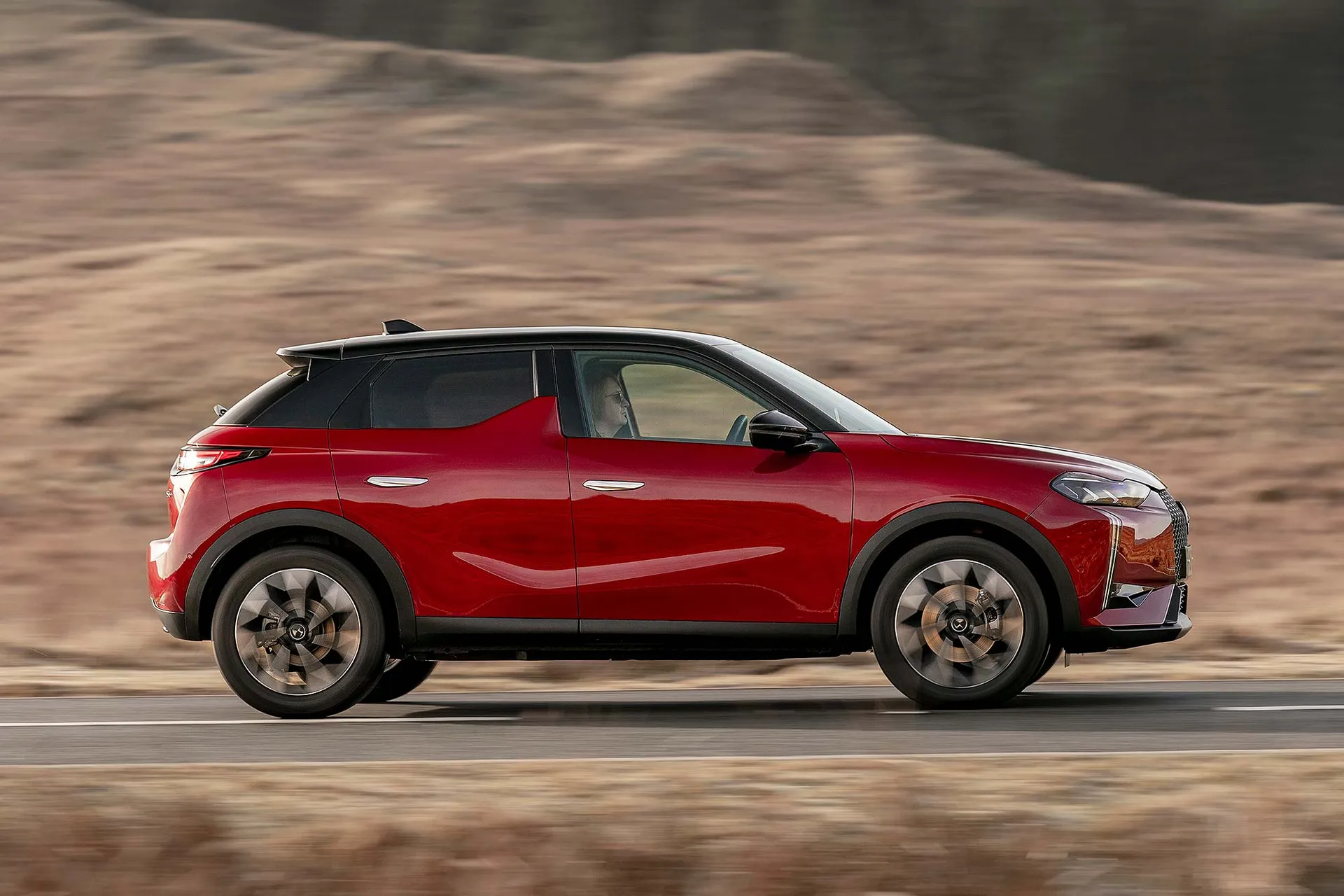
The DS 3 is sold with a pair of three-cylinder petrol engines, which promise to deliver relatively affordable fuel costs.
The entry-level Puretech 100 engine, offered solely for the Performance Line model, demonstrates the best official economy figures. In the WLTP combined test, this engine delivers an average of between 45.3 mpg and 54.3mpg.
Opting for the more powerful Puretech 130 engine, with its eight-speed automatic gearbox, makes the car slightly less efficient. This version has a combined average between 45.6mpg and 48.7mpg.
For those who want even lower running costs, the pure-electric DS 3 E-Tense version will appeal, particularly if you can charge the car at home.
How reliable is the DS 3?
DS was not included in the 2022 Honest John Satisfaction Index, but Citroen (its related brand) did form part of the survey. Citroen was placed in the bottom five brands for reliability. With the premium image that DS wants to portray, the DS 3 will hopefully prove to be more reliable.
The DS 3 comes as standard with a three-year or 60,000-mile warranty. This is standard when compared to other European brands, but lags behind the warranties offered by Hyundai and Kia.
DS does offer the chance to extend the warranty for the DS 3, along with adding European breakdown cover.
Insurance groups and costs
Despite its premium image and higher price tag, the DS 3 should be a fairly cheap crossover SUV to insure.
The 100PS manual version of the DS 3 falls into insurance group 15 (out of 50 groups in total).
Choosing the more powerful 130PS engine, combined with the automatic transmission, increases this insurance rating a little. Performance Line versions will be in group 20, while the Voyage de Esprit and Opera models are found in group 21.
VED car tax: What is the annual road tax on a DS 3?
When it comes to VED (road tax), the DS 3 is an affordable option, helping to offset its higher purchase price.
The petrol engines offered for the DS 3 come with relatively low CO2 emissions, keeping VED costs down. First-year costs range between £210 and £255, followed by a flat rate of £180 a year after that.
How much should you be paying for a used DS 3?
“The DS 3 has proven to be popular in the UK, meaning there is plenty of choice on offer. Used prices now start from as low as £13,000.”
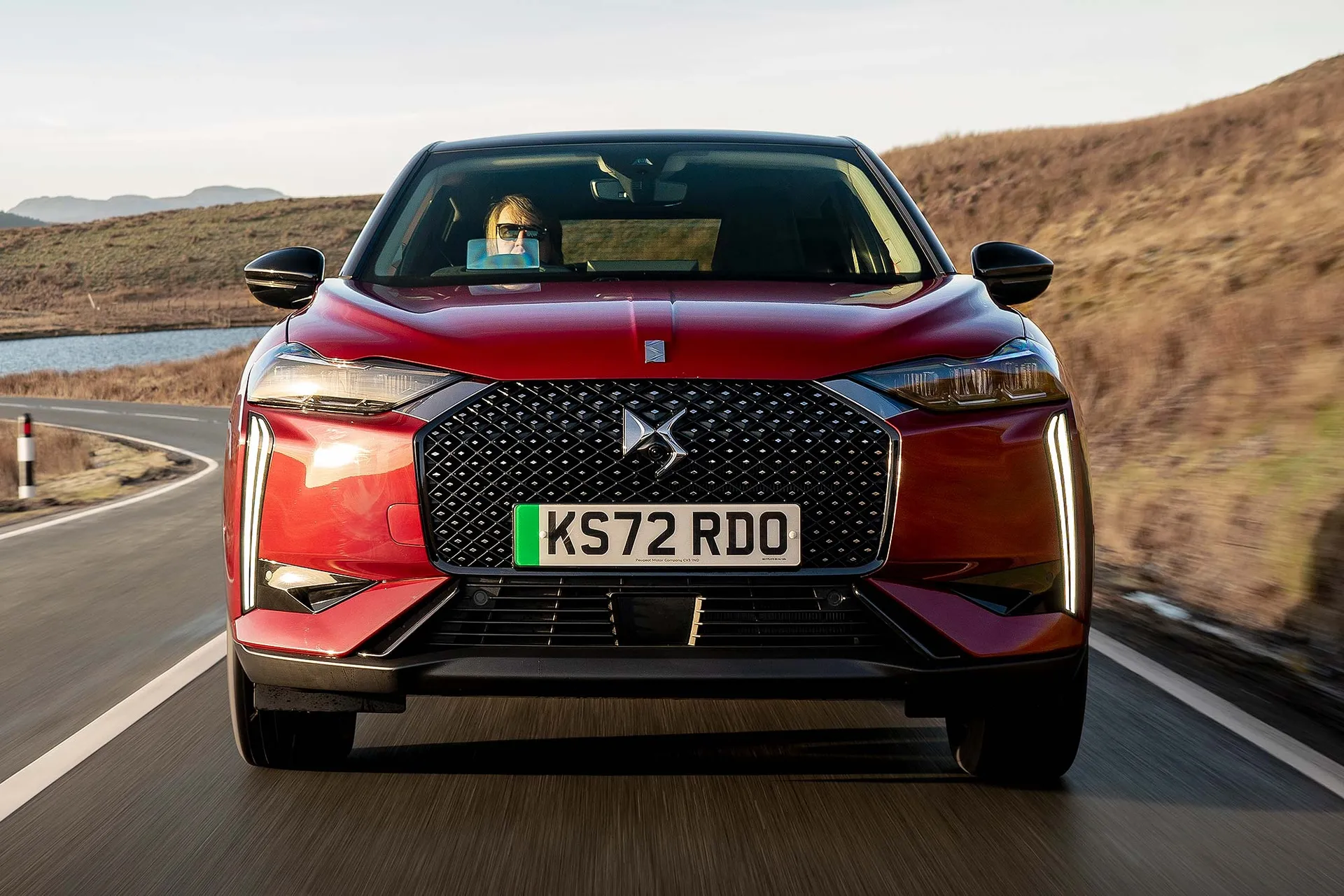
Having been on sale since late 2019, there are now numerous examples of the DS 3 to buy on the used market.
A 1.2 petrol Performance Line model from 2020, with 25,000 miles on the odometer, could be yours for just £12,500. At the other end of the scale, the equivalent 2023 DS 3 in nearly-new condition would cost less than £25,000.
Trim levels and standard equipment
DS Automobiles has changed the model range during the lifespan of the DS 3, but the latest lineup offers a choice of three different trim levels.
Performance Line is now the starting point for the DS 3 range, and includes 17-inch diamond-cut alloy wheels, LED headlights, a black front grille with black accents, chrome door handles and tinted rear windows.
On the inside, the DS 3 Performance Line has seats in a combination of black Alcantara and fabric trim, manually adjustable front seats, a black leather steering wheel and an acoustic windscreen. Keyless start, rear parking sensors and climate control air-con are all included.
A 10.3-inch multimedia touchscreen is fitted, featuring DAB radio, wireless Apple CarPlay and Android Auto connectivity, and a 7.0-inch digital instrument panel. Numerous safety features include lane departure warning and intelligent speed assistance.
The DS 3 Esprit de Voyage replaces the previous Rivoli trim level as the mid-range option. It comes with 18-inch diamond-cut alloy wheels with black centre caps, plus LED tail lights.
Pebble Grey cloth is used for the upholstery, combined with diamond-stitched Nappa leather door trim. The steering wheel sees the airbag covered with leather and the dashboard gains a Pebble Grey fabric finish.
Other features include keyless entry and start, TomTom speed camera alerts and front door sill trims with an Esprit de Voyage logo. There is also 3D satellite navigation with voice recognition and over-the-air updates.
At the top of the DS 3 range is Opera trim. This wears 18-inch diamond-cut alloy wheels, high-beam assistance and a black front grille with chrome detailing.
Basalt Black leather upholstery can be found inside, with the front seats heated and benefiting from eight-way electric adjustment. The driver even gets a seat with a built-in massage function. A head-up display comes as standard, as do front and rear parking sensors, plus a 360-degree surround-view camera.
Ask the heycar experts: common questions
Are DS models made by Citroen?
Is the DS 3 electric?
How long is the warranty on the DS 3?
Get our latest advice, news and offers
Keep me updated by email with the latest advice, news and offers from heycar.
By submitting you agree to our privacy policy
